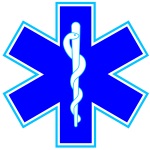Ventricular Tachycardia with a Palpable Pulse
From Protocopedia
Section 4 - CARDIAC
4.09 VENTRICULAR TACHYCARDIA with a PALPABLE PULSE
- INITIAL MEDICAL CARE (2.01) - OXYGEN @ 100% via NRB mask or assist with BVM.
STABLE AND SYMPTOMATIC:
- LIDOCAINE 1.5 mg / kg IVP. If NO response, repeat at 0.5 mg / kg IVP in 5 minutes. If tachycardia converts start LIDOCAINE DRIP @ 2 mg / minute;
- If NO response, repeat LIDOCAINE 0.5 mg / kg IVP until maximum of 3 mg/kg administered. In patients over age 70 or in those with known hepatic disease, administer LIDOCAINE boluses at 0.25 mg/kg until maximum of 1.5 mg / kg administered.
Physician's Orders: If NO response, contact Medical Control for consult.
UNSTABLE:
| Definition of Unstable: Persistent Wide Complex Tachyarrhythmia causing: |
|---|
|
- SYNCHRONIZED CARDIOVERSION
- Initial recommended doses:
- If narrow and regular complexes 50-100 Joules biphasic
- If narrow and irregular complexes 120-200 Joules biphasic
- If wide and regular complexes 100 Joules biphasic
- If wide and irregular complexes – use defibrillation dose (not synchronized)
- Initial recommended doses:
- If IV established prior to patient becoming UNSTABLE, may administer VERSED 2-5 mg IVP, IO or IN AND REPEAT 2 mg every 30 seconds to one minute if patient is conscious.
- If Ventricular Tachycardia converts refer to STABLE PRACTICE PARAMETER for administration of LIDOCAINE.
- If NO response, SYNCHRONIZED CARDIOVERSION @ 200 Joules.
- If NO response, SYNCHRONIZED CARDIOVERSION @ 360 Joules.
| DEFIBRILLATION should be considered instead of synchronized cardioversion if the patient is deteriorating rapidly to avoid delays associated with synchronization. |
|---|
